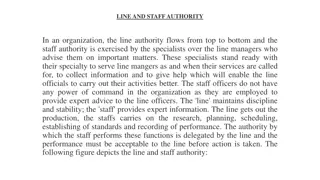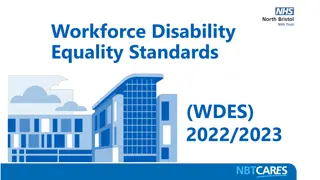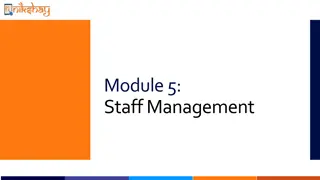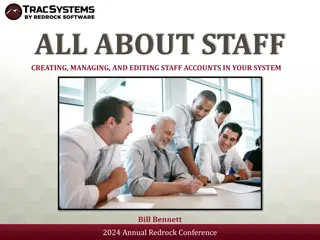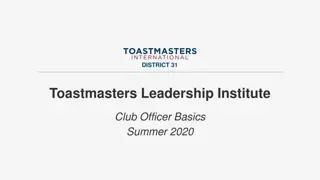
Employee Relations and Collective Bargaining Agreements
Explore the intricacies of employee relations, management rights, and collective bargaining agreements in the workplace. Gain insights into key contacts, negotiation strategies, typical contract provisions, and navigating contract ambiguities effectively.
Download Presentation

Please find below an Image/Link to download the presentation.
The content on the website is provided AS IS for your information and personal use only. It may not be sold, licensed, or shared on other websites without obtaining consent from the author. If you encounter any issues during the download, it is possible that the publisher has removed the file from their server.
You are allowed to download the files provided on this website for personal or commercial use, subject to the condition that they are used lawfully. All files are the property of their respective owners.
The content on the website is provided AS IS for your information and personal use only. It may not be sold, licensed, or shared on other websites without obtaining consent from the author.
E N D
Presentation Transcript
Leadership Institute Working with Support Staff March 12, 2021
Key Contacts Work with your unit H.R. Administrator first. OFFICE OF EMPLOYEE RELATIONS Rick Fanning, Director, rickfanning@hr.msu.edu Andrew Jarvis, Human Resources Manager, ANDREWJA@hr.msu.edu Lilyan Talia, Human Resources Analyst, talialil@hr.msu.edu
Employee Relations Role Establish and maintain relations with leadership of 10 bargaining units representing MSU employees Negotiate collective bargaining agreements Assist and counsel supervisors and administrators on contract interpretation, performance management/setting expectations, and issuing discipline
Managements Rights Management s Rights clause allows one to determine: The work to be performed, the method of performing the work and standards, the location and schedule; The number of people needed to perform the work; To lay off for lack of work, lack of funds; To reprimand, suspend and discharge for just cause; etc. Except as where abridged by contract, law or past practice.
Constraints to Management Rights Collective Bargaining Agreements Mandatory Subjects of Bargaining MSU policies and procedures (Some) Past practices Federal, state and local laws/ordinances Alphabet Soup - PERA, FOIA, RCPD, FMLA, FLSA
Typical Contract Provisions Recognition Union Security Union Dues Seniority Provisions Grievance Procedure Management s Rights Employee Rights Filling Vacancies Overtime Supervisor Working Job Classifications Layoffs and Recall Discipline and Discharge Leaves of Absence
Contract Ambiguities May, shall, could, will, may not, must Patent ambiguities Terms are open to various interpretation Ex. reasonable , or short durations Contact ER for practice and guidance Latent ambiguities Language seems clear until applied Ex. Preference is based on seniority Contact ER for practice and guidance Contract vs. Law vs. Policy vs. Past Practice
Lists in Labor Relations By definition limit the scope of the applicable provision If there is a list without qualification, case law presumes items not on the list were intentionally left out Management s Rights Retain all rights not otherwise abridged Job Descriptions All other duties as assigned Bereavement Leave Specific relationships listed in each contract Disciplines
Myth 2 A bypass employee is someone else s poor performer.
Contracts allow management to determine the size and makeup of units and to layoff employees when necessary. Union contracts speak to whom is laid off when work is eliminated or reorganized. Job classifications are based on work performed. Layoff is never to be used to take the place of performance management.
Myth 3 It takes five years to fire an employee!
Performance Management Coaching document with a note to yourself that you place in your supervisory file Counseling similar to coaching but follow up with written document to the employee Discipline/Discharge either progressive or summary and written on specific form; triggers right to union representation (Weingarten Rights) If it s not documented, it didn t happen!
Weingarten Rights When Employees have a right to Union representation: When a supervisor believes discipline may result from an investigatory meeting When an employee reasonably believes discipline may result from an investigatory meeting - Supervisor can declare the meeting will be non-disciplinary When Employees do not have a right to Union representation (but supervisor may allow it): Evaluations Counseling Sessions Informal discussions
Policy Guidance Support Staff Rules Governing Personal Conduct of Employees Policy: https://www.hr.msu.edu/policies- procedures/support-staff/support-staff-policies- procedures/personal_conduct.html Disciplinary Action Policy: https://www.hr.msu.edu/policies- procedures/support-staff/support-staff-policies- procedures/discipline.html
Myth 4: A Performance Improvement Plan (PIP) is an amnesty period.
How will we align our skills, incentives, and resources to create a plan to achieve our collective vision? https://president.msu.edu/initiatives/strategic- plan/planning-process/key-questions.html
Performance Management Tips for Pandemic and Remote Work Keep with it! Do not postpone coaching, feedback, 1/1, performance reviews. Work changes, expectations and goals may need to be adjusted. Establish short term, define criteria for success and re-evaluate and reiterate often. Task based. Don t ignore performance issues or delay accountability conversations.
HR Contact Information Solutions Center 517-353-4434 or (800) 353-353-4434 solutionscenter@hr.msu.edu Need an answer to an HR question? Call this number to get the answers you need. Organization and Professional Development 517-355-0183 prodev@hr.msu.edu Want suggestions to build your own development plan? Looking for guidance in addressing skill gaps with your team? Call OPD to get on the right track. Presenter: Christy Turner turner.c@hr.msu.edu







